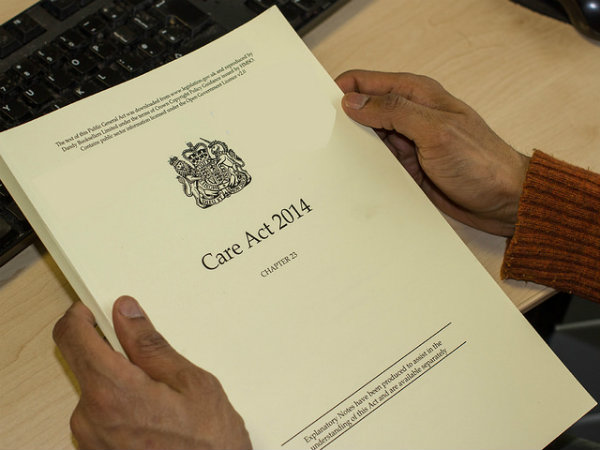
The pressure on councils to deliver on their Care Act duties is ‘increasing tensions’ over deals to integrate mental health social workers in NHS trusts, research has found.
A report by Health Education North West and MerseyCare NHS Trust found integrated arrangements were generally viewed as benefiting people who used services by improving holistic care planning and reducing duplication of assessments.
However, researchers warned the pressure to deliver the Care Act within tightening budgets meant councils were reviewing arrangements and seeking greater control over how social workers in health teams are being used.
Emad Lilo, the integration project manager and the report’s lead author, said: “Integration in mental health is facing unprecedented challenges. Increasingly local authorities have been questioning its value with a view that it may have impacted on the ability of their staff to undertake core local authorities’ duties, such as social care assessment of need, personalisation and safeguarding.
“Significant to note, this has become more acute with the development of more explicit duties and processes in line with the Care Act 2014 implementation.”
Integration – problems and opportunities
Strengths
- Service user experience enhanced by one common approach
- Close working relationships at all levels
- Access to NHS trust training and development for social care staff
- Medical model dominance challenged
Weaknesses
- Reduced effectiveness of personalisation
- Watering down responsibility of social care staff
- Focus all on health processes
- Reduced focus on safeguarding
Opportunities
- Clearer definition of role and function of social work in mental health services
- Creation of social care lead posts in mental health trusts
Last month Community Care revealed Somerset council is considering withdrawing its social workers from NHS teams, claiming the move would improve compliance with the Care Act.
The Health Education North West report is based on findings from a survey of 80 social workers, NHS staff and academics and 24 in-depth interviews with social care directors and NHS managers.
Respondents shared mixed experiences of integration. Some health organisations had created social care leadership roles, including at director level, to strengthen support. Effective arrangements led to better working relationships and brought benefits of better service user experience and more training opportunities for health and social care staff.
However, poorly managed integration left social workers in health teams feeling their role was “watered down” and seen as simply providing extra staff to meet health priorities, rather than a distinct social work contribution.
While most surveys found a “mutual respect” existed between health and social care staff, some examples were given of tensions at organisational level. Local authorities sometimes felt NHS trusts were benefiting from extra staffing to meet health priorities, while some health services complained they were “victims of cost shunting” and left to cover increasing gaps in social care provision.
The report found mental health trusts opposed the removal of social care staff from integrated teams because they believed it would “reduce the ability to provide a holistic response to service users”.
“For integration to work it needs to be owned, understood and valued at a number of levels and that ownership replicated in professional leadership and respect. That in turn needs to be reflected in performance indicators, owned by all, that value outcomes based on recovery and human rights,” it concluded.
In a foreword for the report, Lyn Romeo, chief social worker for adults, said services had to think carefully about how to deliver the best integrated responses for people using services.
She said: “Arrangements that have resulted in a watering down of the unique contributions that social workers or other professionals should be making will not deliver integrated responses to people’s health and social care needs.
“It is great that this work has been undertaken and demonstrated real practice leadership. This report is a significant contribution in supporting integration arrangements now and in the future. I hope good use will be made of the findings to put in place the best possible conditions and culture to make sure we get it right for people.”


 Bournemouth, Christchurch and Poole
Bournemouth, Christchurch and Poole  Hampshire County Council
Hampshire County Council  Lincolnshire County Council
Lincolnshire County Council  Norfolk County Council
Norfolk County Council  Northamptonshire Children’s Trust
Northamptonshire Children’s Trust  South Gloucestershire Council
South Gloucestershire Council  Wiltshire Council
Wiltshire Council  Wokingham Borough Council
Wokingham Borough Council  Children and young people with SEND are ‘valued and prioritised’ in Wiltshire, find inspectors
Children and young people with SEND are ‘valued and prioritised’ in Wiltshire, find inspectors  How specialist refugee teams benefit young people and social workers
How specialist refugee teams benefit young people and social workers  Podcast: returning to social work after becoming a first-time parent
Podcast: returning to social work after becoming a first-time parent  Podcast: would you work for an inadequate-rated service?
Podcast: would you work for an inadequate-rated service?  Family help: one local authority’s experience of the model
Family help: one local authority’s experience of the model  Workforce Insights – showcasing a selection of the sector’s top recruiters
Workforce Insights – showcasing a selection of the sector’s top recruiters 

 Facebook
Facebook X
X LinkedIn
LinkedIn Instagram
Instagram
Care Act to me seems a peice of poorly drafted legislation, It’s impact in MH teams is anti integration. It’s overly beurocratic, tries to cover tooo many principles, reduces SW’s to mere functionaries!